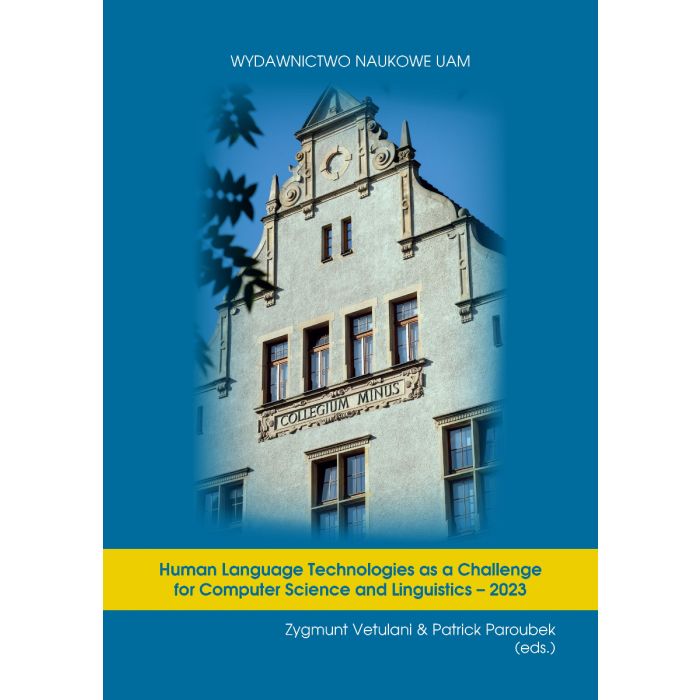Human Language Technologies as a Challenge for Computer Science and Linguistics – 2023
- Dostępność: brak w magazynie
- ISBN: 978-83-232-4177-5 (PDF)
- DOI: 10.14746/amup.9788323241775
- Kategoria: Dostęp otwarty, Informatyka, Ebooki
- Data wydania: 2023


Monografia wpisuje się w działalność wspierającą rozwój technologii językowych w obliczu nowych wyzwań w świecie naznaczonym pandemią COVID-19, wojnami w Europie, masowymi migracjami i klęskami żywiołowymi na skalę niespotykaną od wielu lat.
W tomie zaprezentowano wypowiedzi 186 autorów z ponad 20 krajów z Afryki, Azji, Australii, Europy i Ameryki Północnej. Ich tematyka obejmuje duży obszar technologii językowych i dziedzin pokrewnych.
List of Reviewers
Preaface by Zygmunt Vetulani and Patrick Paroubek
Nilufar Abdurakhmonova, Alisher Ismailov and Rano Sayfullaeva / Turkic language stemmer python package for Natural Language Processing
Jolanta Bachan, Marek Kubis, Natalia Maria Łozińska and Marta Kunegunda Witkowska / Towards analysis of hegemonic masculinity in the dialogues of Polish novels
Françoise Bacquelaine / DeepL and Google Translate Translating Portuguese Multi-Word Units into French: Progress, Decline and Remaining Challenges (2019-2023)
Brigitte Bigi / An analysis of produced versus predicted French Cued Speech keys
Lynne Bowker / Combining plain language and machine translation for science communication
Alexandra Ciobotaru, Diana Constantina Hoefels and Stefan Daniel Dumitrescu / Emotion Signals for Sexist and Offensive Language Detection: A Multi-task Learning Approach
Grażyna Demenko, Paweł Skórzewski, Tomasz Kuczmarski and Mikołaj Pieniowski / Linguistic Information Extraction from Text-based Web to Discover Criminal Activity
Matthew Eget, Xuchen Yang and Yves Lepage / A Study in the Generation of Multilingually Parallel Middle Sentences
Iris Eshkol-Taravella, Angèle Barbedette, Xingyu Liu and Valentin-Gabriel Soumah / Automatic Classification of Spontaneous vs Prepared Questions in Speech Transcriptions
Bojan Evkoski and Senja Pollak / XAI in Computational Linguistics - Understanding Political Leanings in the Slovenian Parliament
Swapnil Fadte, Edna Vaz, Atul Kr Ojha, Ramdas Karmali and Jyoti Pawar / Empirical Analysis of Oral and Nasal Vowels of Konkani
Rashel Fam and Yves Lepage / Investigating parallelograms: Assessing several word embedding spaces against various analogy test sets in several languages using approximation
Ewelina Gajewska and Barbara Konat / Text Classification for Subjective Phenomena on Disaggregated Data and Rater Behaviour
Thomas Gerald, Sofiane Ettayeb, Louis Tamames, Ha Quang Le, Patrick Paroubek and Anne Vilnat / A new approach to generate teacher-like questions guided by text spans extraction
Monika Grajzer, Mikołaj Pabiszczak, Agnieszka Bętkowska Cavalcante and Michał Raszewski / A Voice-Based Neural Network System for Accessing Embedded Home Automation Devices
Ryo Hashimoto, Masashi Takeshita, Rafal Rzepka and Kenji Araki / Development of Japanese WSC273 Winograd Schema Challenge Dataset and Comparison between Japanese and English BERT Baselines
Friederike Hohl and Bettina Braun / Using amplitude envelope modulation spectra to capture differences between rhetorical and information-seeking questions
Irina Illina and Dominique Fohr / Semantic Information Investigation for Transformer-based Rescoring of N-best Speech Recognition
Balázs Indig and Dániel Lévai / I’m Smarter than the Average BERT! – Testing Language Models Against Humans in a Word Guessing Game
Balázs Indig and Tímea Borbála Bajzát / Bags and Mosaics: Semi-automatic Identification of Auxiliary Verbal Constructions for Agglutinative Languages
Patrick Juola / Stylometry: a Need for Standard
Olha Kanishcheva / ASSETUK: a Dataset for Ukrainian Text Simplification
Oleg Kapanadze, Nunu Kapanadze, Gideon Kotzé and Natia Putkaradze / Unsupervised Syntactic Analysis of the Georgian Language Clause
Irakli Kardava / Optimizations of Some Well-Known NLP Algorithms
Maciej Karpinski, Ewa Jarmolowicz-Nowikow, Katarzyna Klessa, Janusz Taborek and Michał Piosik / DARIAH. PL MultiCo Multimodal Corpus
Elmurod Kuriyozov, Ulugbek Salaev, Sanatbek Matlatipov and Gayrat Matlatipov / Text classification dataset and analysis for Uzbek language
Tiziano Labruna and Bernardo Magnini / Simulating Domain Changes in Task-oriented Dialogues
Koena Ronny Mabokela, Tim Schlippe, Mpho Raborife and Turgay Celik / Language-Independent Sentiment Labelling with Distant Supervision: A Case Study for English, Sepedi and Setswana
Khabibulla Madatov, Sanatbek Matlatipov and Mersaid Aripov / Uzbek text’s correspondence with the educational potential of pupils: a case study of the School corpus
Khabibulla Madatov, Shukurla Bekchanov and Jernej Vičič / Uzbek text summarization based on TF-IDF
Margot Madina, Itziar Gonzalez-Dios and Melanie Siegel / Easy-to-Read in Germany: a Survey on its Current State and Available Resources
Tanjim Mahmud, Michal Ptaszynski and Fumito Masui / Vulgar Remarks Detection in Chittagonian Dialect of Bangla
Madina Mansurova, Nurgali Kadyrbek and Talshyn Sarsembayeva / Aspect Based Sentiment Analysis by Morphological Features of The Kazakh Language
Hansjörg Mixdorff and Roberto Togneri / Evaluation of Foreign Accent Prosody in L2 English Using CNNs
Emese K Molnár and Andrea Dömötör / Experiments on error detection in morphological annotation
Jürgen Neyer, Sassan Gholiagha and Mitja Sienknecht / Do Arguments Migrate? Using NLP for Understanding Academia
Ata Nizamoglu, Lea Dahm, Talia Sari, Vera Schmitt, Salar Mohtaj and Sebastian Möller / A Transfer Learning Approach for SDGs Classification of Sustainability Reports
Nor Saiful Azam Bin Nor Azmi, Michal Ptaszynski, Juuso Eronen, Karol Nowakowski and Fumito Masui / Token and Part-of-Speech Fusion for Pretraining of Transformers with Application in Automatic Cyberbullying Detection
Anouar Nouri, Salar Mohtaj, Sebastian Möller and Tilman Lesch / A Comparative Study of Claim Extraction Techniques Leveraging Transformer-based Pre-Trained Models
Jędrzej Osiński and Daniel Rimoli / User Experience aspects of the WordNet-based digital asset search enhancement
Moumita Pakrashi, Brigitte Bigi and Shakuntala Mahanta / Resources Creation of Bengali for SPPAS
Marco Palomino, Rohan Allen and Aditya Padmanabhan Varma / Depression in the Times of COVID-19: A Machine Learning Analysis Based on the Profile of Mood States
Paweł Paściak, Danijel Koržinek and Dariusz Czerski / Self-supervised Domain Adaptation of Statistical Language Models for Automatic Speech Recognition
Mariia Razno / Comparative Analysis Of Speech-To-Text Systems For Ukrainian Dialects
Aleksandra Rewerska and Antonina Świdurska / RPGs: small-scale register analysis using the taxonomy of discourse units
Aleksandra Rykowska and Konrad Juszczyk / SylLab: program for automatic sentiment analysis of poetry based on frequencies of phonetic units
Rafal Rzepka, Shinji Muraji and Akihiko Obayashi / Utilizing Wikipedia for Retrieving Synonyms of Trade Security-related Technical Terms
Felix Schneider, Sven Sickert, Phillip Brandes, Sophie Marshall and Joachim Denzler / Hard is the Task, the Samples are Few: A German Chiasmus Dataset
Emre Sevindik, Elif Ergin, Kübra Erat, Pınar Onay Durdu / Artificial Neural Networks based Baby Sign Language Recognition via Wearable Sensors
Maksud Sharipov, Elmurod Kuriyozov, Ollabergan Yuldashev and Og‘abek Sobirov / UzbekTagger: The rulebased POS tagger for Uzbek language
Nomsa Skosana, Respect Mlambo and Muzi Matfunjwa / Strategies for creating corpora and language resources for under-resourced South African indigenous languages
Joanna Szwoch, Mateusz Staszkow, Rafal Rzepka and Kenji Araki / Sentiment Analysis of Polish Online News Covering Controversial Topics – Comparison Between Lexicon and Statistical Approaches
Ilija Tavchioski, Marko Robnik-Šikonja and Senja Pollak / Detection of depression on social networks using transformers and ensembles
Irina Temnikova, Silvia Gargova, Ruslana Margova, Veneta Kireva, Ivo Dzhumerov, Tsvetelina Stefanova and Hristiana Krasteva / New Bulgarian Resources for Studying Deception and Detecting Disinformation
Gaurish Thakkar, Nives Mikelic Preradović and Marko Tadić / CroSentiNews 2.0: A Sentence-Level News Sentiment Corpus
Ualsher Tukeyev, Gulstan Akhmet, Nargiza Gabdullina, Aliya Turganbayeva and Tolganai Balabekova / Kazakh-Uzbek Machine Translation on the Base of Complete Set of Endings Model
Sireesha Vakada, Anudeep Chaluvadi, Mounika Marreddy and Radhika Mamidi / IndicSumm: Summarization Resource Creation for Eight Indian Languages
Zygmunt Vetulani and Peter Odrakiewicz / Challenges and a New Paradigm Frontier of Human Language Technology Applications in Business Management, Business Communication in Organizations and Society
Lu Wang, Michal Ptaszynski, Pawel Dybala, Yuki Urabe, Rafal Rzepka and Fumito Masui / Improving Performance of Affect Analysis System by Expanding Affect Lexicon
Yaling Wang, Bartholomäus Wloka and Yves Lepage / Translation Memory Principle in Neural Machine Translation: A Multilingual and Multidirectional Comparison
Liyan Wang, Zhicheng Pan, Haotong Wang, Xinbo Zhao and Yves Lepage / Solving Sentence Analogies by Using Embedding Spaces Combined with a Vector-to-Sequence Decoder or by Fine-Tuning Pre-trained Language Models
Yizhe Wang, Béatrice Daille and Nabil Hathout / Exploring synonymy relation between\\multi-word terms in distributional semantic models
Liang Xu, Elaine Ui Dhonnchadha and Monica Ward / Exploring the Synergies between Technology and Socio-Cultural Approaches in CALL for Less Commonly Taught languages
Nicolas Zampieri, Irina Illina and Dominique Fohr / Improving Hate Speech Detection with Self-Attention Mechanism and Multi-task Learning
Yiyang Zhang, Masashi Takeshita, Rafal Rzepka and Kenji Araki / Utilizing BERT with Auxiliary Sentences Generation to Improve Accuracy of Japanese Aspect-based Sentiment Analysis Task
Andrzej Zydroń, Rafał Jaworski and Szymon Kaczmarek / Large Language Models and the future of the Localization
Industry
Author index
The monograph is a part of activity of fostering sound development of language technologies aiming at facing new challenges in the world marked by the COVID-19 pandemic, wars in Europe, mass migrations and natural disasters at the scale not seen since many years.
In the volume are presented contributions by 186 authors from more than 20 countries from Africa, Asia, Australia, Europe and North America. The contributions to this book cover large area of language technologies and related fields.
| Informacje szczegółowe | |
|---|---|
| Preaface |
Pobierz plik

|
| Contents |
Pobierz plik

|
|
|
|
| Wersja publikacji | e-book, otwarty dostęp |
| Język | angielski |
| Tytuł (EN) | Human Language Technologies as a Challenge for Computer Science and Linguistics – 2023 |
| Typ publikacji | Monografia |
| Wydanie | I |
| ISBN | 978-83-232-4177-5 (PDF) |
| DOI | 10.14746/amup.9788323241775 |
| Liczba stron | 358 |
